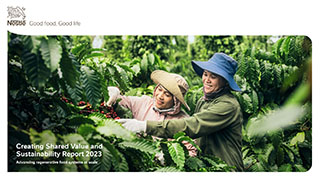Our approach to identifying and addressing human rights risks

A just transition to a regenerative food system demands a multifaceted approach that puts people first. Our Human Rights Framework and Roadmap provides the foundation.
We are committed to respecting and advancing human rights in our operations and supply chains, using our scale to raise awareness, build capacity among our colleagues and business partners, and empower communities and individuals. We have embedded human rights in our company structures and in our policies to ensure that decision-making considers the human rights implications, and that we remain compliant with regulatory frameworks.
Actively identifying potential human rights violations
Our Human Rights Framework and Roadmap
Our Human Rights Framework and Roadmap aims to enhance our level of due diligence across our value chain, while strengthening our positive impact on the ground towards a just transition to a regenerative food system.
By building on our history of embedding human rights within our organization and of assessing human rights risks on the ground, our framework provides the basis for a more strategic approach to scaling our efforts, enhancing the human rights capacities of our colleagues and business partners, monitoring our achievements and being open about the challenges we face.
Understanding our salient issues
Our salient issues are the areas we have identified as those human rights at risk of the most severe negative impact on people through our activities or business relationships.
They are informed by human rights impact assessments (HRIAs) carried out between 2009 and 2017 and the human rights risk assessment (HRRA) methodology that we developed over the course of 2020 and 2021, as well as our audit, monitoring and grievance mechanisms and processes. Our new Human Rights Steering Committee oversees and guides the strategic direction and implementation of the Salient Issue Action Plans.
Our 10 salient issues are:
- Child labor and access to education
- Forced labor and responsible recruitment
- Living income and living wage
- Gender equity, non-discrimination and non-harassment
- Safety and health at work
- Freedom of association and collective bargaining
- Right to water and sanitation
- Indigenous Peoples and Local Communities' land rights
- Data protection and privacy
- Right to food and access to nutritious, affordable and adequate diets
Salient issue action plans
We have developed action plans for our ten salient issues. These plans articulate our strategy for embedding, assessing, addressing and reporting on each salient issue, defining what we need to do across our value chain, as well as what collective action can be taken. As we implement these action plans and integrate them into our global programs and sourcing strategies (including the Nestlé Cocoa Plan, the Nescafé Plan 2030, the Nespresso AAA Sustainable QualityTM Program and our dairy strategy), we aim to report on progress by the end of 2025.
Engaging stakeholders on the ground
We recognize the importance of listening to and consulting stakeholders, including the most vulnerable ones, on issues that affect them. As we implement our action plans, we aim to engage with rightsholders and their representatives to enhance our understanding of the root causes of human rights issues and develop programs to assess and address risks on the ground.

-
Farmers in our supply chain and their families -
Workers in our supply chain, including at farm level -
Communities in and around our operations and supply chains, including women and children -
Our employees and on-site contractors -
Consumers
Enabling human rights
Respecting and advancing human rights must be carefully integrated into the way businesses operate. To enhance our due diligence approach, we have identified five key enablers that will help further enhance the way we conduct due diligence and advance respect for human rights on the ground.
1 Governance and Incentives
We integrate human rights at all levels of our governance structure.
2 Policies and Control Systems
We leverage our policies and control systems to embed human rights throughout the organization.
3 Engagement and Advocacy
We engage with key stakeholders and advocate for smart due diligence legislation and collective action on the ground.
4 Strategic Partnerships
We partner with thought-leading and boots-on-the-ground organizations.
5 Transparency and Reporting
We provide a high level of transparency on the progress we make and the challenges we face.
Raising concerns
Speak Up is our global reporting channel for non-compliance concerns, including any incidents of harassment, discrimination, abuse of power, bullying, fraud, corruption or conflict of interest. The channel is independently operated by a third party and available across all markets. There is more information on Speak Up in the About us section.
Human rights and due diligence are more than just a compliance issue. If done well, it should actively improve people’s lives and make a real difference in communities.


















